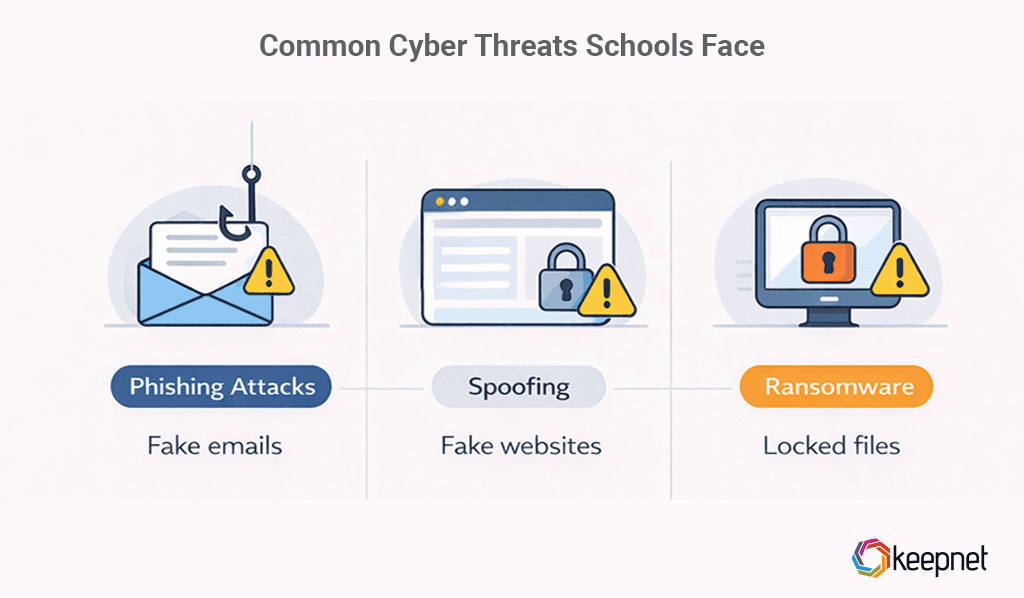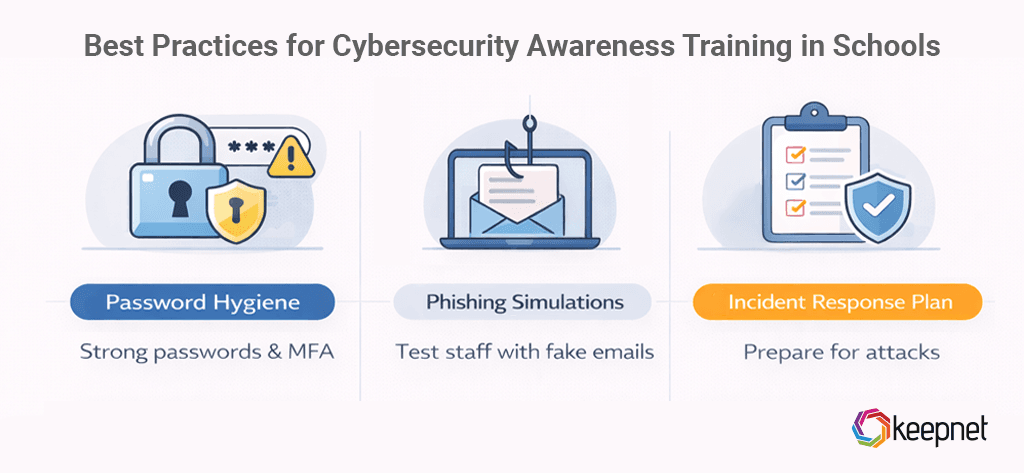Why is Cybersecurity Awareness Important in K-12 and Higher Education?
Cybersecurity threats in education are rising. Learn why cybersecurity awareness is critical for protecting schools from phishing, ransomware, and data breaches, and how to implement effective training to safeguard students and staff.
Cyberattacks on schools are rising at an alarming pace, making both K-12 and higher education institutions prime targets. With so much of learning and administration now online, the importance of cyber security in education has never been greater. From digital classrooms to sensitive student records, schools handle valuable information every day, and without proper protection, that data is at risk. This is why the importance of computer security in schools is no longer optional—it’s an important foundation for safe and uninterrupted learning.
The first and most effective defense is cybersecurity awareness. Technology alone cannot stop every attack, but teaching safe online habits can. Building cybersecurity awareness among students and staff helps prevent common mistakes like falling for phishing emails or using weak passwords. Whether it’s cybersecurity awareness among university students, younger learners, or teachers handling administrative systems, a culture of vigilance creates stronger protection across the board. By prioritizing cybersecurity awareness for students, schools can reduce risks before they escalate into costly breaches.
Governments and agencies are beginning to recognize this urgency. In the U.S., the K-12 Cybersecurity Act tasked CISA with providing resources and a toolkit to help schools protect themselves. But while these tools are useful, real progress starts within the classroom. Schools must take responsibility for promoting school cybersecurity awareness, empowering every member of their community to play a role in defense. In the sections ahead, we’ll explore why awareness is the key to resilience and how schools can take practical steps to safeguard their students, staff, and data.
What is Cybersecurity Awareness, and Why Is It Important in Education?
So, why is cybersecurity awareness important? Simply put, it’s about understanding cyber threats and knowing how to avoid them. In education, this means making sure that everyone—from teachers and students to administrators—knows how to protect digital systems and personal information.
Schools store a treasure trove of sensitive data, like student records, grades, and staff details, making them a top target for cybercriminals. Teachers and staff often juggle many new online platforms and may not be fully aware of how to spot phishing scams or malware attacks. This lack of awareness opens the door for hackers.
Without proper cybersecurity awareness training, school employees might accidentally fall for phishing scams, install malware, or even get tricked by spoofed websites. These mistakes can lead to data breaches, disrupt learning, and expose personal information.
Common Cyber Threats Schools Face

Schools may not have the same resources as large corporations to defend against cyberattacks, yet the risks they face are equally serious. Studies show that many educational institutions dedicate less than 8% of their budget to cybersecurity, leaving them vulnerable to modern threats. This lack of investment makes the importance of cyber security in education even more urgent.
Some of the most common cyber threats targeting schools include:
Phishing Attacks
With so much communication happening via email—between teachers, parents, and students—phishing is a huge problem. Hackers send fake emails that look legitimate, tricking people into clicking on links or sharing personal info. Without phishing awareness, even the most tech-savvy teacher might fall for it.
Phishing simulations are a great way to help staff practice spotting these fake emails. Regular simulations can help identify which users need more training and ensure everyone is better prepared.
Spoofing
Another big threat is spoofing, where attackers create fake versions of trusted websites or emails to steal login information. As schools adopt new digital platforms, teachers and staff are often unfamiliar with the warning signs of spoofed sites, making it easy for hackers to steal their credentials.
One simple way to combat this is by teaching staff about password hygiene and using multi-factor authentication to add an extra layer of protection.
Ransomware
Ransomware attacks are becoming more common in schools, where hackers lock up important files and demand payment to release them. This can bring school operations to a halt—teachers can't access lesson plans, and administrators can't handle day-to-day tasks. According to reports, 44% of schools have experienced a ransomware attack.
Training staff to recognize the early signs of a ransomware attack can minimize the damage. Additionally, having a solid incident response plan in place can help schools recover more quickly if an attack does happen.
Best Practices for Cybersecurity Awareness Training in Schools

Schools can strengthen their defenses by launching school cybersecurity awareness programs that teach both staff and students how to spot and respond to risks. Building cyber security awareness for students helps reduce common mistakes like falling for phishing emails or using weak passwords. For universities, prioritizing cybersecurity awareness among university students ensures sensitive data and research remain protected against growing digital threats.
Here are some key areas schools should focus on:
1. Password Hygiene: First Line of Defense
Teaching teachers and staff about strong password management is one of the easiest and most effective ways to boost security. Encourage staff to use unique, complex passwords and avoid reusing them across different platforms. Combine this with multi-factor authentication (MFA) for an extra layer of protection.
For instance, schools that emphasize password hygiene and use MFA can drastically reduce their risk of data breaches caused by weak or compromised credentials.
2. Phishing Simulations: Real-World Practice
Conducting regular phishing simulations helps staff practice identifying phishing attempts in a safe, controlled environment. These exercises teach staff to be more vigilant about clicking on suspicious links and emails.
Tools like Keepnet Labs’ phishing simulator allow schools to tailor these tests to their specific needs, giving real-world practice on the platforms staff use daily.
3. Incident Response Plan: Be Prepared for the Worst
Every school should have a cyber incident response plan in place. This plan outlines what steps to take in the event of a cyberattack. Without a response plan, schools waste precious time trying to figure out what to do during an attack. A quick, organized response can limit the damage and help get systems back up and running faster.
Training staff on the incident response plan ensures they know how to report suspicious activity and respond quickly to any breaches.
Why Is Cybersecurity Awareness Important for Educational Institutions?
By now, it’s clear that the importance of cybersecurity awareness can’t be overstated. Schools are responsible for protecting vast amounts of sensitive data, from student grades to personal information. Without proper awareness training, that data is at risk.
Cybersecurity awareness not only helps prevent attacks but also ensures that, if an attack does happen, staff know how to respond quickly and minimize the damage. A solid cybersecurity awareness program can save schools from expensive data breaches, ransomware payouts, and a loss of trust.
Reduce Cyber Threats with Security Awareness Training
By focusing on phishing simulations and engaging, interactive training, schools can build a cyber security culture across their entire campus.
After launching a security awareness training program, we saw an 80% increase in phishing detection among staff in many industries in the last 6- 9 months at the Keepnet Human Risk Management Platform. This highlights the importance of cybersecurity awareness in even educational institutions. By prioritizing cybersecurity, schools can significantly reduce the risk of data breaches and ensure the safety of their sensitive information.
Building a Cybersecurity-Aware School
As schools adopt more digital tools, the importance of cybersecurity awareness will only grow. By training staff and students to recognize cyber threats, schools can build a strong first line of defense against attacks like phishing, ransomware, and spoofing.
Train your staff and students to spot threats with tools like phishing simulations and password hygiene training. Investing in cybersecurity awareness training today can save your school from costly breaches tomorrow.
Start protecting your school with Keepnet’s phishing simulator or sign up for a free demo to see how it can strengthen your cybersecurity defenses.
As schools continue to adopt digital learning platforms and online tools, the importance of cyber security in education will only increase. Cybercriminals know that many institutions lack the resources of large corporations, making them attractive targets. By creating a culture of school cybersecurity awareness, schools can prepare their communities to defend against threats like phishing, ransomware, and spoofing before they cause serious harm.
The foundation of this culture is cyber security awareness training. Teachers, administrators, and students should be equipped with practical knowledge, from recognizing suspicious emails to practicing strong password hygiene. Tools such as phishing simulations are especially effective, helping to build cyber security awareness for students by turning abstract risks into real learning experiences. For universities, prioritizing cybersecurity awareness among university students is important, since they often have access to sensitive research and personal data that must remain protected.
Investing in ongoing awareness training programs doesn’t just improve knowledge, it reduces costly breaches and disruptions. Schools that focus on cybersecurity awareness among students and staff develop a strong first line of defense, ensuring that everyone contributes to a safer digital environment. By making awareness part of everyday school life, institutions strengthen resilience and reduce risks significantly.
Take the first step toward building a secure learning community with Keepnet Human Risk Management. Start by running phishing simulations or request a free demo to see how our platform can enhance your defenses, raise awareness, and protect your school from today’s most common cyber threats.
Editor's note: This blog was updated on January 9 th, 2026.